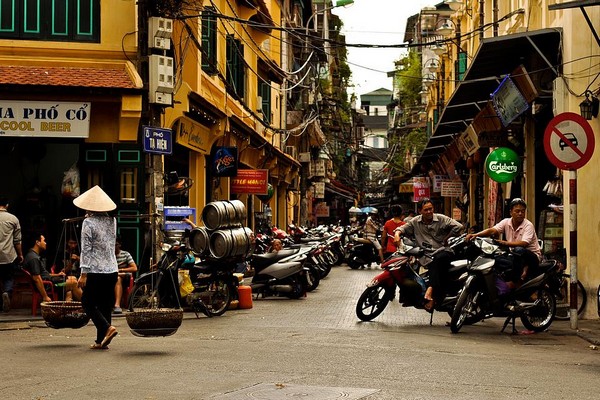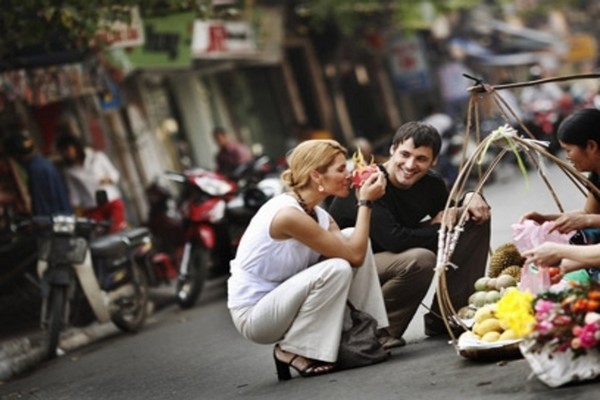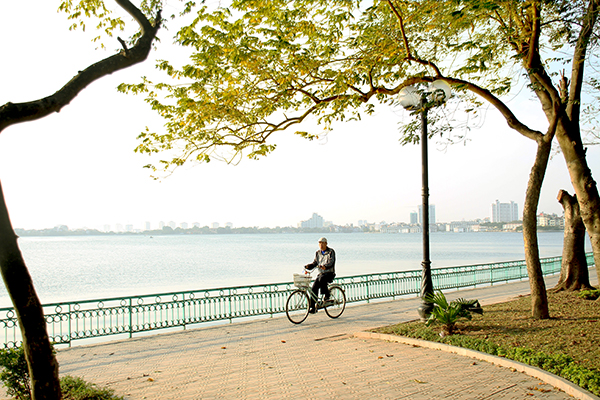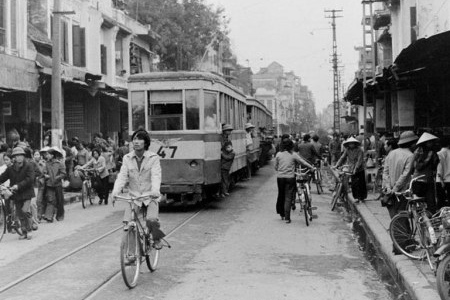The above lines were penned by the Hanoi poet Xuan Dieu, written for one person, whose name is included in the poem. For the first time, this poem has become public. So who is Nguyen Dieu?
The elegantly-named man named Nguyet Dieu is now 84 years old. Climbing the stairs at number 62 Luong Van Can Street - a small street in central Hanoi lined with shops selling eyeglasses - I find myself in a space that evokes Hanoi of decades past. Mr. Dieu's home is long and narrow. Stepping onto the balcony, Hoan Kien Lake appears. I'm reminded of the line: "A gap of sky blooms above the lake".
The walls are filled with photo portraits. They were all taken by Mr. Dieu. There's the poet Xuan Dieu deep in thought and the musician Van Cao with a beard. Master Nam Son, one of the founders of the Indochina Fine Arts College, looks mischievous with his glasses on his head. This photo has appeared many times in different newspapers. The scholar Dao Duy Anh looks hale and hearty, while photographer Do Huan looks like a statesman. Painter Thang Tran Phenh appears serious with a long beard. Musician Ta Tan smiles merrily. The art critic Le Thanh Duc looks anxious. Photographer Vo An Ninh is lying beneath a pumpkin vine, as if waiting for sunlight. Artist Luu Cong Nhan stands in his house. Although poor, his smile is radiant. Most of those pictured, I realize, have passed away long ago.

The man who took these photos has a long face and a large forehead. When I entered his house he was lying on his bed in a dark corner. He seemed glad to see me and asked me to take a seat near his bed. The room held a precious camera cabinet and a high-tech stereo system. I guessed that the stereo might have been a gift from his kids, to help him to relax. A year ago Mr. Dieu contracted palsy. Sometimes, he can barely move around his house with the aid of a wooden frame.
After some conversation, Mr. Dieu revealed his photo shop's brand name: Nang Vang (Golden Sunlight). “In the ‘70s, every professional photographer and photojournalist knew this brand name”, recalls Hanoi photographer Nguyen Dinh Toan. "Mr. Nguyet Dieu was regarded the master in reshooting developed photos. Film was quite rare at that time. And Mr. Nguyet Dieu cut the French large- sized film (for shooting from airplanes) to get 3Smm film to use in a normal camera. That was a huge discovery. Photojournalists also knew Mr. Nguyet Dieu tor his talent in repairing damaged him. He could fix every mistake, even if the film got opaque or over-bright”.

For five years Mr. Dieu had worked for the Newspapers of Literature and Arts. He was one of the first photojournalists working in Hanoi following the city's liberation. He took portraits of artists like Xuan Dieu, Van Cao, Nam Son, Do Huan, Dao Duy Anh, Thang Tran Phenh and Thai Ba Van around this time. The poet Xuan Dieu composed her verse about him as a gift, offering her appreciation to a fellow talented artist.
People assume that the shop's brand name Nang Vang (Golden Sunlight) relates to the perfect lighting of his photos. "It wasn't that simple," said Mr. Dieu. "I played with the words, because the letters in Nang Vang can be rearranged into Vang Nang, which means ‘with - out you’. When I asked who 'You' was, he just smiled.
If somebody calls me a photographer, I'll refuse that title. I regard myself as a photo-craftsman," said Mr. Dieu. "I've pursued this career for half a century, first to earn my living and bring up my four children. It was quite hard." Mr. Dieu was born in Hung Yen and moved to Hanoi in 1950. In 1957, already working as a photographer, he bought his house on Luong Van Can Street. He moved his photo shop there and worked for many more decades.
When I mentioned portrait photography, Mr. Dieu's eyes lit up. He explained his philosophy of the "tooth-tongue style'; a lesson taught by Confucius. “When Confucius was about to die, he asked his followers if he still had some teeth left but he didn't. He then asked if he still had his tongue, and of course he did;' said Mr. Dieu. "Confucius commented that the flexible object had evidently outlasted the firm ones. That philosophy can be regarded as a social doctrine that has endured for more than 2,000 years and works up to now. The object for a portrait photographer is to capture the character's face, which contains both still and living, and flexible and firm features. The photographer must recognize and emphasize those features to reveal the person's character”.

To feed his family, Mr. Dieu worked from home at night. For years he barely slept. Being up all night leads to worry, reports Mr. Dieu. Sometimes he lays awake thinking about photography today, and worrying about the effect of digital equipment. “It's key that a photo reveal substance,” he said. “Nowadays, it's no big deal to photo-shop pictures. We end up with fake boobs, fake butts, fake faces... It's the era of fake stuff”.
Listening to him, I laughed but it was a troubled laughter. Hanoi is now totally different from the city in which Mr. Dieu spent most of his life. And admirable citizens like Mr. Dieu are rare too. They are dignified, humble, quiet and profound.
Sometimes Mr. Dieu ducked his head and smiled mischievously. I wanted to take a photo of him while he was raising his head a little. But he would not agree, said it would be a waste. Then he joked: “I'm now just 84, not so handsome now”. Nguyet Dieu is a silent Hanoi. He has never cultivated fame. He represents old-style Hanoi taste and style. I was told that the poet Vu Dinh Lien (the author of the famous poem Ong do - The Scholar) had once composed some verses to Nguyet Dieu. Meeting Mr. Dieu, I was suddenly reminded of two verses by Vu Dinh Lien: Them the ancient people / Where has their spirit gone?
We can say that people like Nguyet Dieu now belong to the past. They are old and rarely met. But while life is rough and harsh, it is good to remember that some loving ties remain to connect us to the past.
Related Links



